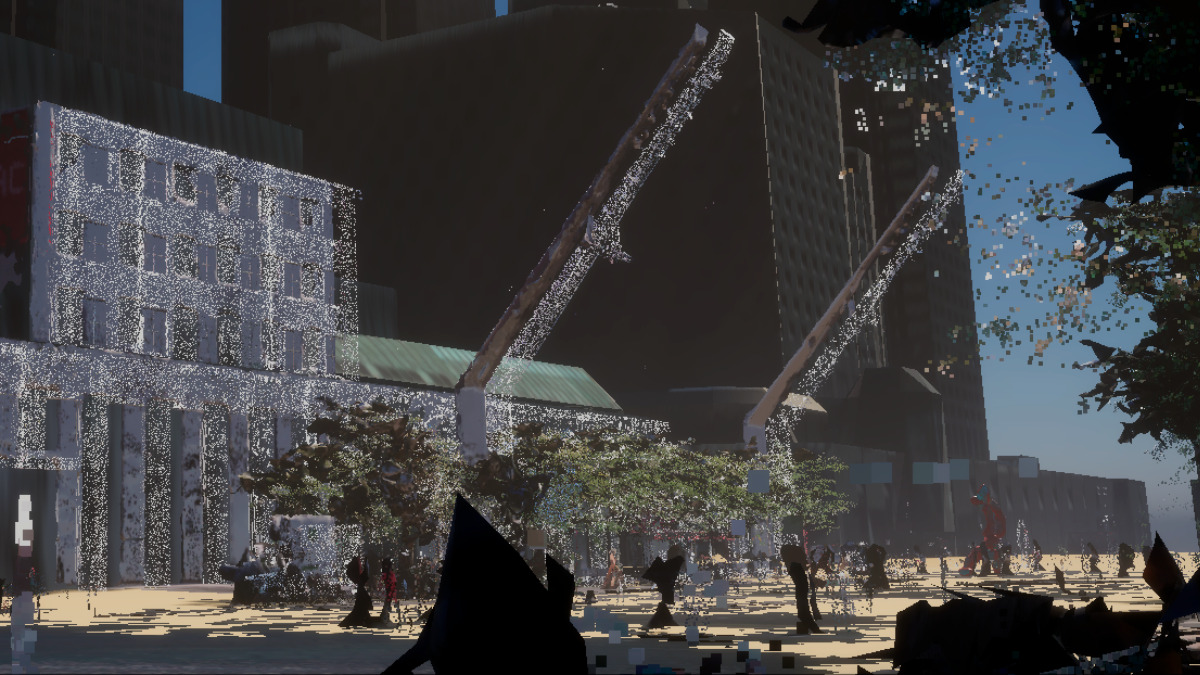DEMONSTRATION AND DISCUSSION
2:30 - 4:00 pm / In person / French
Valued for its immersive qualities, digital art can serve as a medium to help us explore the senses. Through touch, smell, hearing or sight, our sensory perceptions merge into a universe where the line between reality and illusion is blurred.
Five artists, invited by Yan Breuleux [co-investigator member, UQAC-NAD], will present excerpts from their latest research-creations in digital art. Following the demonstrations, participants will engage in a collective discussion on the mediation of research through creative objects.
FEATURED CREATIONS
Les arbres communiquent entre eux à 220 hertz, by Nelly-Ève Rajotte, Professor, École de design, UQAM
Nelly-Ève Rajotte's project plunges viewers into an immersive sensory experience that explores techno-romantic aesthetics. Using the Boreal Forest as a central motif, the video installation provokes reflection on the ephemeral nature of the world and its own disappearance. It draws inspiration from the sublime landscapes of Romanticism, represented by artists such as Caspar Friedrich and William Turner. Focusing on the conservation of nature through digital technology, this creation uses the LiDAR digitizer to digitally preserve places in danger of extinction, allowing them to be studied and preserved. The title refers to a creative approach aimed at questioning the differences between communication systems in natural and human environments.
Bodies of Water*, by Caroline Laurin-Beaucage, Professor, Département de danse, UQAM
Bodies of Water is a virtual reality choreographic project shot in an aquatic environment. The ten-minute film uses stereoscopic (3D) and ambisonic technology, i.e. sound spatialized according to the orientation of the viewer's head. The work recounts the metamorphosis of bodies in contact with water: an all-encompassing, fluid and malleable material that creates both flexibility and resistance. Produced at the public swimming pool, the work begins as a fiction that gradually slides into a sensory exploration where movement dictates the sole dramaturgy. The venue is plunged into half-light and eight clandestine swimmers emerge from the darkness. Bodies submerged in water cross the boundaries of their habitat and undergo metamorphosis.
*The work is a collaboration between Chélanie Beaudin-Quintin and Caroline Laurin-Beaucage, freely inspired by an original script by Oriane Morriet.
EN/GLOBE, by Marie-Eve Morissette, Masters Candidate, UQAC-NAD*
EN/GLOBE is an immersive, interactive installation that reveals a space for exploration and aims to raise awareness of sensory perception at the visual, tactile, auditory and olfactory levels. Consisting of three unique spheres, the work invites the public to enter and experience each in its own unique way. The work acts as an interface between the artist's intentions and the audience's experience, leaving them free to draw their own interpretation and develop their own narrative. The work is presented as an interactive multimodal system that encourages self-expression. This installation is the second phase of a research-creation project aimed at evaluating the fruitfulness of an innovative approach to interfaces based on encounter and the principles of soma-aesthetics.
The installation was created and presented to the public during a research-creation residency at Hexagram from October 2-13, 2023.
Capter les corps : émergence d’une installation scanographique, by Jean-Philippe Côté, PhD candidate, études et pratiques des arts, UQAM ; and Louis-Philippe Rondeau, Professor, Cofounder of the Mimesis Laboratory, UQAC-NAD*
The contemporary processes of digital photography - immediate and direct, algorithmically manipulated in real time - paradoxically contribute to distancing the subject, eroding the connection between the medium and its referent. From the perspective of media archaeology, the installation revisits a pivotal moment in digital photography: the advent of the scanner, a tool that has now been relegated to the periphery by the smartphone. Reminiscent of David Hockney's photographic "joiners" and Yves Klein's anthropometries, the installation captures an intimate imprint of the subject over an extended temporality in prolonged physical contact. It reverses the tendency to control our mediated image, leaving room for the contingencies of the device and its material serendipity.
MODERATION
Yan Breuleux, Associate Professor, Head of the Mimesis Laboratory, UQAC-NAD*
*(Hexagram member)
This program is presented by the École des arts numériques, de l’animation et du design de l’Université du Québec à Chicoutimi (UQAC-NAD) and the research chair CREAT.

